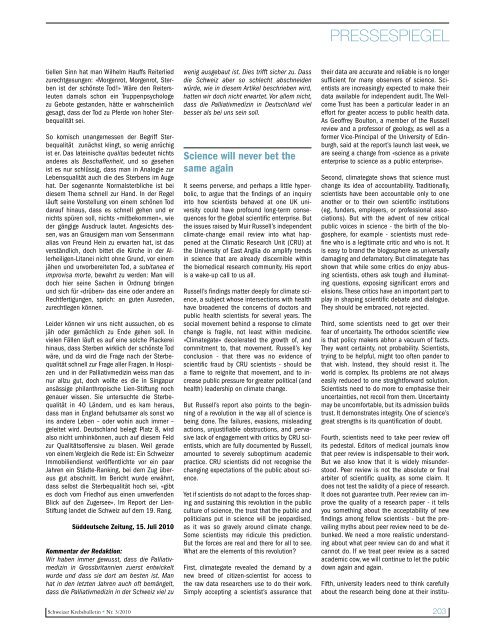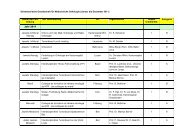Pragmatische Lösung eines komplexen Problems Schweizer ...
Pragmatische Lösung eines komplexen Problems Schweizer ...
Pragmatische Lösung eines komplexen Problems Schweizer ...
Sie wollen auch ein ePaper? Erhöhen Sie die Reichweite Ihrer Titel.
YUMPU macht aus Druck-PDFs automatisch weboptimierte ePaper, die Google liebt.
PRESSESPIEGEL<br />
tiellen Sinn hat man Wilhelm Hauffs Reiterlied<br />
zurechtgesungen: «Morgenrot, Morgenrot, Sterben<br />
ist der schönste Tod!» Wäre den Reitersleuten<br />
damals schon ein Truppenpsychologe<br />
zu Gebote gestanden, hätte er wahrscheinlich<br />
gesagt, dass der Tod zu Pferde von hoher Sterbequalität<br />
sei.<br />
So komisch unangemessen der Begriff Sterbequalität<br />
zunächst klingt, so wenig anrüchig<br />
ist er. Das lateinische qualitas bedeutet nichts<br />
anderes als Beschaffenheit, und so gesehen<br />
ist es nur schlüssig, dass man in Analogie zur<br />
Lebensqualität auch die des Sterbens im Auge<br />
hat. Der sogenannte Normalsterbliche ist bei<br />
diesem Thema schnell zur Hand. In der Regel<br />
läuft seine Vorstellung von einem schönen Tod<br />
darauf hinaus, dass es schnell gehen und er<br />
nichts spüren soll, nichts «mitbekommen», wie<br />
der gängige Ausdruck lautet. Angesichts dessen,<br />
was an Grausigem man vom Sensenmann<br />
alias von Freund Hein zu erwarten hat, ist das<br />
verständlich, doch bittet die Kirche in der Allerheiligen-Litanei<br />
nicht ohne Grund, vor einem<br />
jähen und unvorbereiteten Tod, a subitanea et<br />
improvisa morte, bewahrt zu werden: Man will<br />
doch hier seine Sachen in Ordnung bringen<br />
und sich für «drüben» das eine oder andere an<br />
Rechtfertigungen, sprich: an guten Ausreden,<br />
zurechtlegen können.<br />
Leider können wir uns nicht aussuchen, ob es<br />
jäh oder gemächlich zu Ende gehen soll. In<br />
vielen Fällen läuft es auf eine solche Plackerei<br />
hinaus, dass Sterben wirklich der schönste Tod<br />
wäre, und da wird die Frage nach der Sterbequalität<br />
schnell zur Frage aller Fragen. In Hospizen<br />
und in der Palliativmedizin weiss man das<br />
nur allzu gut, doch wollte es die in Singapur<br />
ansässige philanthropische Lien-Stiftung noch<br />
genauer wissen. Sie untersuchte die Sterbequalität<br />
in 40 Ländern, und es kam heraus,<br />
dass man in England behutsamer als sonst wo<br />
ins andere Leben – oder wohin auch immer –<br />
geleitet wird. Deutschland belegt Platz 8, wird<br />
also nicht umhinkönnen, auch auf diesem Feld<br />
zur Qualitätsoffensive zu blasen. Weil gerade<br />
von einem Vergleich die Rede ist: Ein <strong>Schweizer</strong><br />
Immobiliendienst veröffentlichte vor ein paar<br />
Jahren ein Städte-Ranking, bei dem Zug überaus<br />
gut abschnitt. Im Bericht wurde erwähnt,<br />
dass selbst die Sterbequalität hoch sei, «gibt<br />
es doch vom Friedhof aus einen umwerfenden<br />
Blick auf den Zugersee». Im Report der Lien-<br />
Stiftung landet die Schweiz auf dem 19. Rang.<br />
Süddeutsche Zeitung, 15. Juli 2010<br />
Kommentar der Redaktion:<br />
Wir haben immer gewusst, dass die Palliativmedizin<br />
in Grossbritannien zuerst entwickelt<br />
wurde und dass sie dort am besten ist. Man<br />
hat in den letzten Jahren auch oft bemängelt,<br />
dass die Palliativmedizin in der Schweiz viel zu<br />
wenig ausgebaut ist. Dies trifft sicher zu. Dass<br />
die Schweiz aber so schlecht abschneiden<br />
würde, wie in diesem Artikel beschrieben wird,<br />
hatten wir doch nicht erwartet. Vor allem nicht,<br />
dass die Palliativmedizin in Deutschland viel<br />
besser als bei uns sein soll.<br />
Science will never bet the<br />
same again<br />
It seems perverse, and perhaps a little hyperbolic,<br />
to argue that the findings of an inquiry<br />
into how scientists behaved at one UK university<br />
could have profound long-term consequences<br />
for the global scientific enterprise. But<br />
the issues raised by Muir Russell’s independent<br />
climate-change email review into what happened<br />
at the Climatic Research Unit (CRU) at<br />
the University of East Anglia do amplify trends<br />
in science that are already discernible within<br />
the biomedical research community. His report<br />
is a wake-up call to us all.<br />
Russell’s findings matter deeply for climate science,<br />
a subject whose intersections with health<br />
have broadened the concerns of doctors and<br />
public health scientists for several years. The<br />
social movement behind a response to climate<br />
change is fragile, not least within medicine.<br />
«Climategate» decelerated the growth of, and<br />
commitment to, that movement. Russell’s key<br />
conclusion - that there was no evidence of<br />
scientific fraud by CRU scientists - should be<br />
a flame to reignite that movement, and to increase<br />
public pressure for greater political (and<br />
health) leadership on climate change.<br />
But Russell’s report also points to the beginning<br />
of a revolution in the way all of science is<br />
being done. The failures, evasions, misleading<br />
actions, unjustifiable obstructions, and pervasive<br />
lack of engagement with critics by CRU scientists,<br />
which are fully documented by Russell,<br />
amounted to severely suboptimum academic<br />
practice. CRU scientists did not recognise the<br />
changing expectations of the public about science.<br />
Yet if scientists do not adapt to the forces shaping<br />
and sustaining this revolution in the public<br />
culture of science, the trust that the public and<br />
politicians put in science will be jeopardised,<br />
as it was so gravely around climate change.<br />
Some scientists may ridicule this prediction.<br />
But the forces are real and there for all to see.<br />
What are the elements of this revolution?<br />
First, climategate revealed the demand by a<br />
new breed of citizen-scientist for access to<br />
the raw data researchers use to do their work.<br />
Simply accepting a scientist’s assurance that<br />
their data are accurate and reliable is no longer<br />
sufficient for many observers of science. Scientists<br />
are increasingly expected to make their<br />
data available for independent audit. The Wellcome<br />
Trust has been a particular leader in an<br />
effort for greater access to public health data.<br />
As Geoffrey Boulton, a member of the Russell<br />
review and a professor of geology, as well as a<br />
former Vice-Principal of the University of Edinburgh,<br />
said at the report’s launch last week, we<br />
are seeing a change from «science as a private<br />
enterprise to science as a public enterprise».<br />
Second, climategate shows that science must<br />
change its idea of accountability. Traditionally,<br />
scientists have been accountable only to one<br />
another or to their own scientific institutions<br />
(eg, funders, employers, or professional associations).<br />
But with the advent of new critical<br />
public voices in science - the birth of the blogosphere,<br />
for example - scientists must redefine<br />
who is a legitimate critic and who is not. It<br />
is easy to brand the blogosphere as universally<br />
damaging and defamatory. But climategate has<br />
shown that while some critics do enjoy abusing<br />
scientists, others ask tough and illuminating<br />
questions, exposing significant errors and<br />
elisions. These critics have an important part to<br />
play in shaping scientific debate and dialogue.<br />
They should be embraced, not rejected.<br />
Third, some scientists need to get over their<br />
fear of uncertainty. The orthodox scientific view<br />
is that policy makers abhor a vacuum of facts.<br />
They want certainty, not probability. Scientists,<br />
trying to be helpful, might too often pander to<br />
that wish. Instead, they should resist it. The<br />
world is complex. Its problems are not always<br />
easily reduced to one straightforward solution.<br />
Scientists need to do more to emphasise their<br />
uncertainties, not recoil from them. Uncertainty<br />
may be uncomfortable, but its admission builds<br />
trust. It demonstrates integrity. One of science’s<br />
great strengths is its quantification of doubt.<br />
Fourth, scientists need to take peer review off<br />
its pedestal. Editors of medical journals know<br />
that peer review is indispensable to their work.<br />
But we also know that it is widely misunderstood.<br />
Peer review is not the absolute or final<br />
arbiter of scientific quality, as some claim. It<br />
does not test the validity of a piece of research.<br />
It does not guarantee truth. Peer review can improve<br />
the quality of a research paper - it tells<br />
you something about the acceptability of new<br />
findings among fellow scientists - but the prevailing<br />
myths about peer review need to be debunked.<br />
We need a more realistic understanding<br />
about what peer review can do and what it<br />
cannot do. If we treat peer review as a sacred<br />
academic cow, we will continue to let the public<br />
down again and again.<br />
Fifth, university leaders need to think carefully<br />
about the research being done at their institu-<br />
<strong>Schweizer</strong> Krebsbulletin • Nr. 3/2010 203



